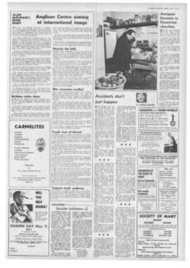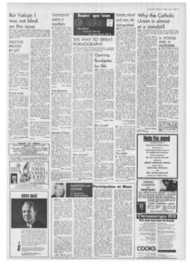Page 4, 1st May 1970
Page 4

Report an error
Noticed an error on this page?If you've noticed an error in this article please click here to report it.
Tags
Share
Related articles
Seat In The House?
Norman St John-stevas
Life After Death For Two Ex-mps
Norman Conquest
Dare Our Political Leaders Risk A Referendum?
Damping down election fever
by Norman St. John Stevas
DURING the last week it has become apparent even
to the least politically interested that the General Election campaign is in full swing. The secret of the date may be locked in the recesses of Mr. Harold Wilson's mind, and possibly even he does not yet know it, but nevertheless the campaign goes on.
We now face the dismal prospect of anything of up to a year of continual electioneering since the Prime Minister does not legally have to hold an election until May of 1971 when the parliamentary quinquennium expires. Certainly the public does not want a year of electioneering: politicians along with others in public life, such as bishops and generals, are currently held in low esteem and they are not seen in their best light when trying to score points off one another.
Prolonged electioneering does not do the country as such any good: important decisions are deferred: unpopular though necessary actions are not taken: forward planning is suspended. Private industry is unable to take long-term decisions because it has no idea of the kind of political climate it will have to operate in during the next five years. Politicians themselves suffer because they feel obliged to fulfil every constituency engagement however trivial and rise to their feet in the House whenever the slightest opportunity opens up. The penalty for them is nervous exhaustion: for others ennui and boredom.
All this will be accompanied over the period until the election date is actually announced, with bursts of speculation as to the timing of the great event. Will it be June or will it be October? Or will it not be until the Spring of next year? Or will the wily Harold pull a really fast one and hold a General Election in July when more Tories than labourites are away on holiday? And is August really a closed season for elections as has gem-ally been supposed? And might he not even have an election just before Christmas to compete with the attractions of the shopping spree? And so on ad nauseam.
Do we really have to endure all this? The answer is we do as long as we maintain our present constitutional system of hiving fixed maximums for Parliament but not fixed minimums. The Prime Minister must have an election at the end of five years but within that period he is free to hold it when he wishes.
The convention at one time was that the decision over an election was one for the Cabinet but it has now been firmly established, that the decision is for the Prime Minister alone. The merits of the British system are said to be flexibility. In his classic work The English Constitution. Walter Bagehot contrasts the fortunate position of the British in this respect with the Americans. Under the American Constitution everything is fixed: Congress is elected for two years: the Senate for six: the President for four. Come hell or high water when their term of office is up an election must be held.
Changing national mood
Walter Bagehot praised the British system because it enabled elections to be held to take account of changes in situation or national mood. A peace parliament could be dissolved and a war parliament elected if the circumstances changed. A Prime Minister who lost support in the House of Commons would be obliged to dissolve and go to the country if he could not form an alternative government. In fact it has not worked out like this at all.
When the 1939 War broke out far from being dissolved the life of Parliament was extended and no election held until 1945. Prime Ministers do not lose support in the House of Commons: the party system sees to that. The real effect of the "flexible" system is that it enables a Prime Minister to manipulate the economy and the news so that he can choose the most favourable possible moment after the mid-term to go to the country and secure the re-election of his government to power and his own return to No. 10.
Such is this power that it is little short of a miracle that any government manages to lose an election. Such is the fascination of the unknown that election fever rages unabated for anything from eight to twelve months and the interest of the reigning Prime Minister is to keep it going in order to lure his opponents to come out in to the open with their policies and ploys and reach their peak too soon.
Having seen the system in action for nearly twenty years under both Conservative and Labour Governments I have become convinced that it would be much better to have fixed terms for elections. The present maximum of five years is about right: the seven years that existed until the Parliament Act of 1910 was too long: the Chartist demand for annual elections too short. If we had fixed terms the election campaign would be limited to the six penultimate months before the five years was up.
Furthermore, because all the parties would know with certainty the actual date the whole would be com ducted in a much lower key. It would only hot up towards the end when the dissolution had actually been announced. We should all be a lot more peaceful and a lot less bored and the country would be better off.
And what chance is there of this desirable reform being carried out? Absolutely none. It is an Opposition argument. Once an Opposition becomes a Government the advantages to it of having the choice of election date, even within limits, becomes all important. All the heady arguments of the days in Opposition evaporate.
What. is sauce for the Leader of the Opposition is certainly not sauce for the Prime Minister. Human nature being what it is and original sin being always with us we shall have to wait a long time for a change in our electoral system. Until in fact the Greek Kalends.
blog comments powered by Disqus













